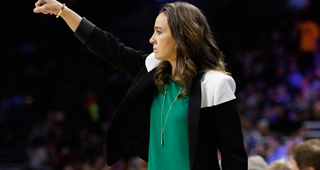Last week, with the playoffs still in low gear, but the dial hovering near 3000 rpms, it was reported Becky Hammon would interview with the Milwaukee Bucks for their head-coaching vacancy. The NBA Twittersphere leapt with excitement at the news because NBA fans are, on the whole, very progressive. It’s a diverse league that’s overwhelmingly African-American with more than a smattering of foreign-born exports dotting NBA rosters. That translates to the crowd, too, with NBA audiences leaning left. The NBA’s focus on inclusivity was trumpeted further when they, along with the WNBA, partnered with LeanIn.org to support equality at home and in the workplace. Becky Hammon personifies that lean, so most around the league were justifiably excited the Bucks were speaking with her about possibly replacing interim coach and Basketball Twitter punching bag, Joe Prunty.
However, there was an influential sect of NBA Twitter that seemed to think Hammon had “skipped the line,” i.e. she hadn’t followed the traditional path to a head coaching gig in the NBA and other, more deserving, candidates should get the opportunity before she did. The caveat to that argument is all the former NBA players who skipped the line: Mark Jackson, Steve Kerr, Derek Fisher, Jason Kidd (Milwaukee’s coach earlier this year) and a host of others have all gone from playing to head coaching without the usual time spent as an assistant or a head coach at a lower level (a top college program, or the G League). The breakdown seemed to stem from the fact that Hammon played in the WNBA, which isn’t the same as playing in the NBA.
Race was also brought up (Hammon is white). The idea was that there are more experienced assistants who weren’t even invited to interview with the Bucks, and who also happen to have a darker skin pigment. This entire exchange is important and shouldn’t be disregarded as sexist, or racist, or some combination of both. Discussion is almost always a good thing because it means the participants are actively trying to understand a complicated concept rather than fall back on an easy answer or––to use more recognizable parlance for our time––take. But discussion is different than Twitter.
The response on Twitter to the “skipped the line” take was laden with the type of furor and recriminations you see when people tweet about politics (or TV shows, or movies, or animals, or the best cereal, or whether a hot dog is a sandwich, or––we could go on, but that’s another piece, one I will never write). Milwaukee’s decision to interview Hammon for the head coaching job became a polarizing subject because of this blowback. Because it’s not wrong, but neither is the very real progress that Hammon was asked to interview.
Nevertheless, like most conversations around race and identity, there was a lot left unsaid during this dialogue. Tone, countenance, body language and all the imperceptible cues we use to communicate with each other get lost when an exchange happens in 280 characters or less between two people who don’t know anything about each other––save a specious, ever-changing bio, an easily misunderstood avatar, and whatever other context-free information you glean from looking at old tweets––and aren’t even facing each other in the same place (why do you think a growing number of writers and reporters automatically delete their tweets every few days?).
By all accounts, Becky Hammon is a terrific assistant coach for the San Antonio Spurs. She’s also an all-time WNBA star who has lived the game. Besides all that, she’s a second-row NBA coach, which is literally where she sits during Spurs games, but figuratively speaking, it’s the rung she occupies (for now!) in the San Antonio coaching ladder. Maybe after former first-row assistant, James Borrego, was hired to coach the Hornets, Hammon will be promoted to the first row for next season. I hope so.
Running right alongside that is the explicit need for more head coaches of color in the NBA. For a sports league that’s made up of over 75 percent black players, 19 of the 25 occupied coaching positions in the NBA belong to white men. That’s almost exactly the inverse of the players. For such a progressive league, that’s uncomfortably incongruent. So, I get where the “skipped the line” thinking comes from.
Except, Becky Hammon simply interviewed for a job. She wasn’t offered one. And even if she was, does the glaring shortage of minority coaches, many of whom possess a more fully realized resume, automatically disqualify Hammon from taking the gig? When did NBA coaching turn into a perfect meritocracy. When did anything in America, save a Horatio Alger story? Does it mean she shouldn’t even go to the interview? Doesn’t it sound a little short-sighted to tell the only female assistant coach in NBA history to wait for her turn at the next level?
I don’t know the answers to any of these question. They are hard questions that might not even have answers, at least not enough to sate the people disagreeing about this subject. But I can tell you that Twitter isn’t the place to have the discussion. It never is.


